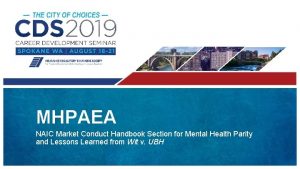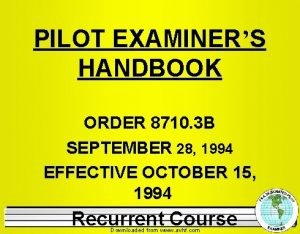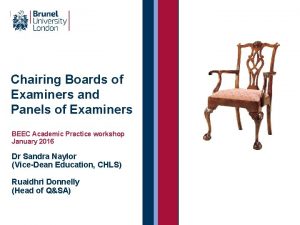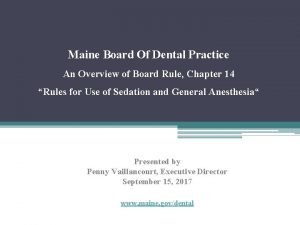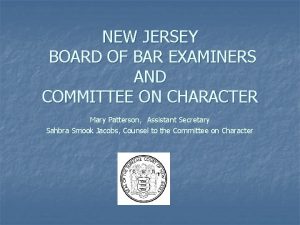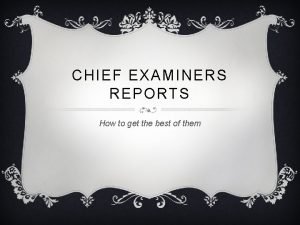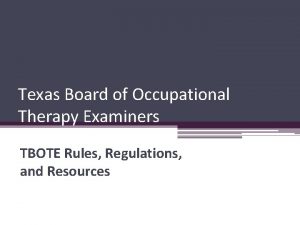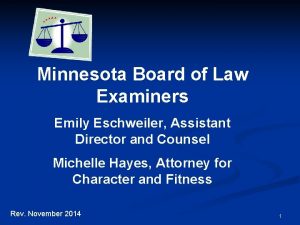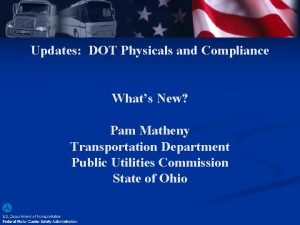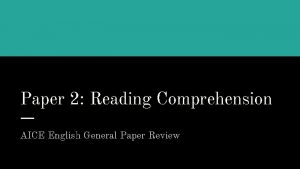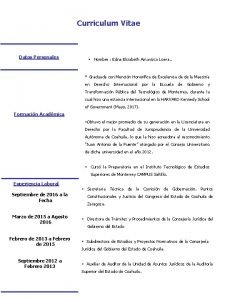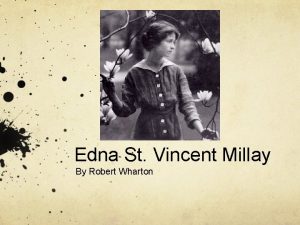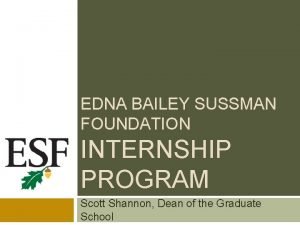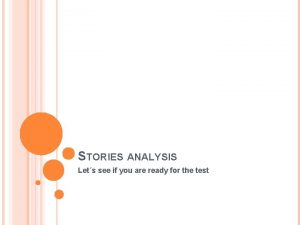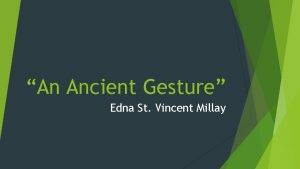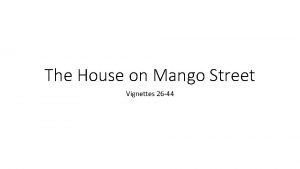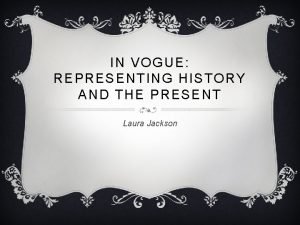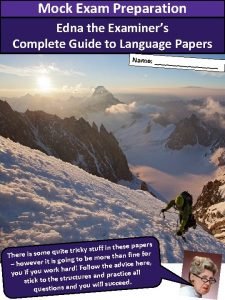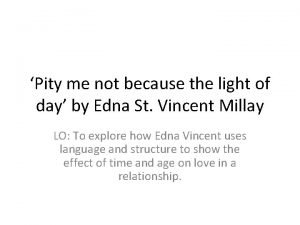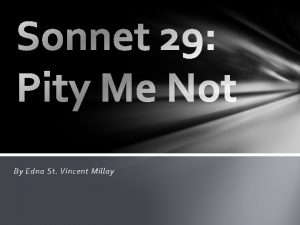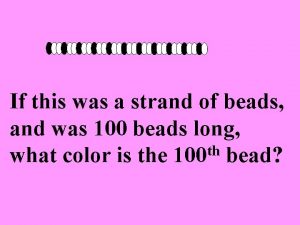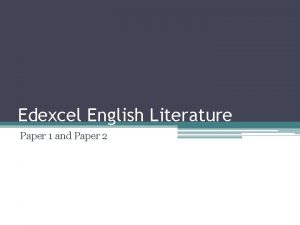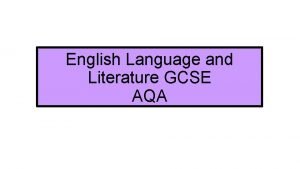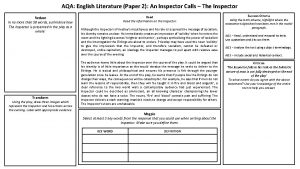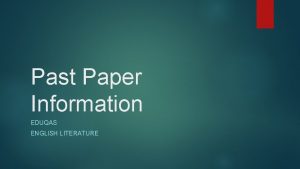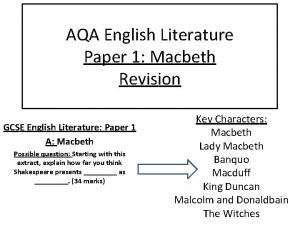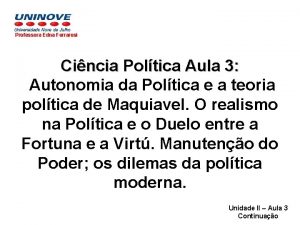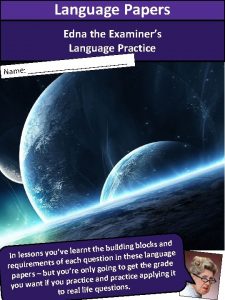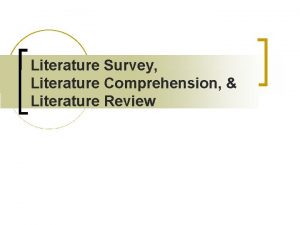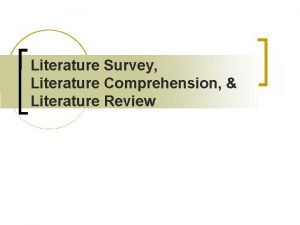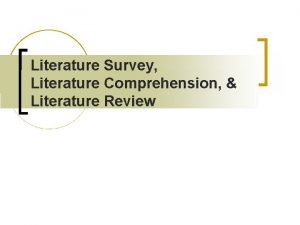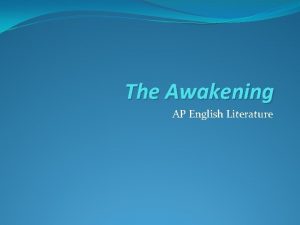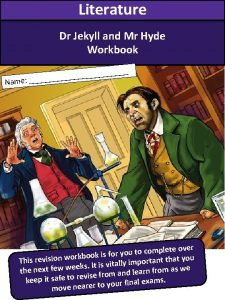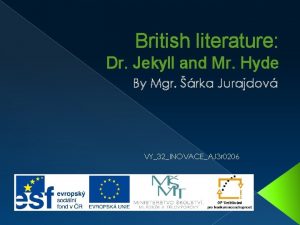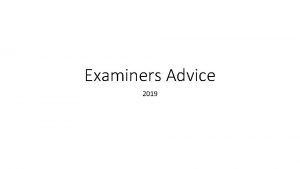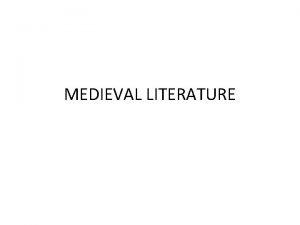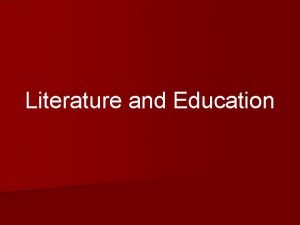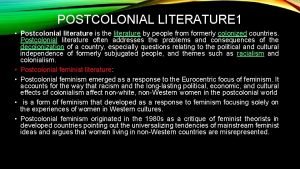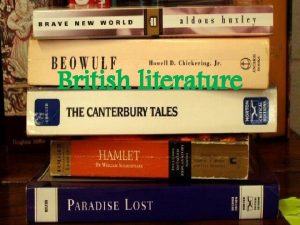Literature Paper 1 Edna the Examiners Dr Jekyll





































- Slides: 37

Literature Paper 1 Edna the Examiner’s Dr Jekyll and Mr Hyde Workbook ______ _ _ Name: ___ mplete o c o t u o y r fo is rkbook portant This revision wo im y ll a it v is It. s w week d learn n over the next fe a m o fr e is v e r safe to exams. l that you keep it a n fi r u o y o t r e e near from as we mov

The Plot On their weekly walk, an eminently sensible, trustworthy lawyer named Mr. Utterson listens as his friend Enfield tells a gruesome tale of assault. The tale describes a sinister figure named Mr. Hyde who tramples a young girl, disappears into a door on the street, and reemerges to pay off her relatives with a check signed by a respectable gentleman. Since both Utterson and Enfield disapprove of gossip, they agree to speak no further of the matter. It happens, however, that one of Utterson’s clients and close friends, Dr. Jekyll, has written a will transferring all of his property to this same Mr. Hyde. Soon, Utterson begins having dreams in which a faceless figure stalks through a nightmarish version of London. Puzzled, the lawyer visits Jekyll and their mutual friend Dr. Lanyon to try to learn more. Lanyon reports that he no longer sees much of Jekyll, since they had a dispute over the course of Jekyll’s research, which Lanyon calls “unscientific balderdash. ” Curious, Utterson stakes out a building that Hyde visits—which, it turns out, is a laboratory attached to the back of Jekyll’s home. Encountering Hyde, Utterson is amazed by how undefinably ugly the man seems, as if deformed, though Utterson cannot say exactly how. Much to Utterson’s surprise, Hyde willingly offers Utterson his address. Jekyll tells Utterson not to concern himself with the matter of Hyde. A year passes uneventfully. Then, one night, a servant girl witnesses Hyde brutally beat to death an old man named Sir Danvers Carew, a member of Parliament and a client of Utterson. The police contact Utterson, and Utterson suspects Hyde as the murderer. He leads the officers to Hyde’s apartment, feeling a sense of foreboding amid the eerie weather—the morning is dark and wreathed in fog. When they arrive at the apartment, the murderer has vanished, and police searches prove futile. Shortly thereafter, Utterson again visits Jekyll, who now claims to have ended all relations with Hyde; he shows Utterson a note, allegedly written to Jekyll by Hyde, apologizing for the trouble he has caused him and saying goodbye. That night, however, Utterson’s clerk points out that Hyde’s handwriting bears a remarkable similarity to Jekyll’s own. For a few months, Jekyll acts especially friendly and sociable, as if a weight has been lifted from his shoulders. But then Jekyll suddenly begins to refuse visitors, and Lanyon dies from some kind of shock he received in connection with Jekyll. Before dying, however, Lanyon gives Utterson a letter, with instructions that he not open it until after Jekyll’s death. Meanwhile, Utterson goes out walking with Enfield, and they see Jekyll at a window of his laboratory; the three men begin to converse, but a look of horror comes over Jekyll’s face, and he slams the window and disappears. Soon afterward, Jekyll’s butler, Mr. Poole, visits Utterson in a state of desperation: Jekyll has secluded himself in his laboratory for several weeks, and now the voice that comes from the room sounds nothing like the doctor’s. Utterson and Poole travel to Jekyll’s house through empty, windswept, sinister streets; once there, they find the servants huddled together in fear. After arguing for a time, the two of them resolve to break into Jekyll’s laboratory. Inside, they find the body of Hyde, wearing Jekyll’s clothes and apparently dead by suicide—and a letter from Jekyll to Utterson promising to explain everything.

The Plot Utterson takes the document home, where first he reads Lanyon’s letter; it reveals that Lanyon’s deterioration and eventual death were caused by the shock of seeing Mr. Hyde take a potion and metamorphose into Dr. Jekyll. The second letter constitutes a testament by Jekyll. It explains how Jekyll, seeking to separate his good side from his darker impulses, discovered a way to transform himself periodically into a deformed monster free of conscience—Mr. Hyde. At first, Jekyll reports, he delighted in becoming Hyde and rejoiced in the moral freedom that the creature possessed. Eventually, however, he found that he was turning into Hyde involuntarily in his sleep, even without taking the potion. At this point, Jekyll resolved to cease becoming Hyde. One night, however, the urge gripped him too strongly, and after the transformation he immediately rushed out and violently killed Sir Danvers Carew. Horrified, Jekyll tried more adamantly to stop the transformations, and for a time he proved successful; one day, however, while sitting in a park, he suddenly turned into Hyde, the first time that an involuntary metamorphosis had happened while he was awake. The letter continues describing Jekyll’s cry for help. Far from his laboratory and hunted by the police as a murderer, Hyde needed Lanyon’s help to get his potions and become Jekyll again—but when he undertook the transformation in Lanyon’s presence, the shock of the sight instigated Lanyon’s deterioration and death. Meanwhile, Jekyll returned to his home, only to find himself ever more helpless and trapped as the transformations increased in frequency and necessitated even larger doses of potion in order to reverse themselves. It was the onset of one of these spontaneous metamorphoses that caused Jekyll to slam his laboratory window shut in the middle of his conversation with Enfield and Utterson. Eventually, the potion began to run out, and Jekyll was unable to find a key ingredient to make more. His ability to change back from Hyde into Jekyll slowly vanished. Jekyll writes that even as he composes his letter he knows that he will soon become Hyde permanently, and he wonders if Hyde will face execution for his crimes or choose to kill himself. Jekyll notes that, in any case, the end of his letter marks the end of the life of Dr. Jekyll. With these words, both the document and the novel come to a close. The story of the story: tists, a professor of ily included engineers, scien fam His. 50 18 in , nd tla n's family urgh, Sco d religious sides of Stevenso an Stevenson was born in Edinb c tifi en sci the see can minister. We philosophy, and a religious d Dr Jekyll and Mr Hyde. reflected in both his life an ys straight he sat en he awoke, for three da Wh. de Hy Mr d an yll Jek Dr ssibly partly t the tale of until it was completed – po ep sle One night, Stevenson dream n’t did he t tha ht ug ote more after page. It is tho m all his life. By hand, he wr fro ed fer in his bed and wrote page suf d ha he ms iption for lung proble write 1000. a result of his cocaine prescr tional writer can expect to fic e rag ave ur yo – y da a then 10, 000 words his wife step-son applauded – but e Th. on p-s ste d an e wif d read the story to his was “merely a story” After three days he went an who Hyde was, and that it of int po the d sse mi d ha d returned to his venson ew the pages on the fire an thr dismissed it, saying that Ste n nso ve Ste e, rag a In. a masterpiece when it should have been room. had written 64, 000 ow today. It is thought he kn we l ve no the h wit irs back downsta Three days later, he came ys. words by hand in just 6 da ndition. of his long-standing lung co ult res a as 44 of e ag the Stevenson died at

Gabriel Utterson ter? ac Why is Utterson a key char Why is it so important Utterson is such a reliable and trustworthy character? Why is it important Utterson is such a relatable character? (He makes mistakes, aims to help others as much as possible) Key Quote “His affections, like ivy, were the growth of time, they implied no aptness in the object” ““Henry Jekyll forged for a murderer!” and his blood ran cold in his veins” “Pull yourself together Bradshaw” said the lawyer. “This suspense, I know, is telling…but it is now our intention to make an end of it” “he had an approved tolerance for others; sometimes wondering, almost with envy, at the high pressure of spirits involved in their misdeeds” What do we learn about Utterson? Pick a language choice – what does this tell us about him?

Gabriel Utterson Language: What do you notice about Utterson’s language? Why is that? Voice: The story is told from a third person narrative – but from Utterson’s point of view. What is the effect of this? “My fears in cline to the same point” If there’s one quote to know: What does Utterson’s language tell us about him? "If he be Mr Hyde, " he had thought, "I shall be Mr Seek. " Stevenson's Purpose: Who does Utterson represent? Utterson is constantly looking for a rationable explanation for this supernatural happening. What does this tell us about Victorian society?

Henry Jekyll ter? Why is Jekyll a key charac Jekyll is the central protagonist – and yet we see very little of him. Our view of him is shaped by others. What do we learn about him from the following: “the very oink of the properties, celebrated too” “fellow who do what they call good” “Too fanciful” “Wrong, wrong in mind” Key Quote Since he was a boy, he was aware of “two natures that contended in the field of consciousness” His scientific studies are “led wholly towards the mystic and the transcendental” “I began to perceive more deeply that it has ever yet been stated, the trembling immateriality” of the human body. Hyde was “knit to him closer than a wife, closer than an eye; lay caged in his flesh” What do we learn about Jekyll? Pick a language choice – what does this tell us about him?

Henry Jekyll Language: What do you notice about Jekyll’s language? Why is that? Voice: The final chapter is a first person account from Jekyll’s poiint of view. What is the effect of this? “With every day, and from both sides of my intelligence, the moral and the intellectual, I thus drew steadily nearer to that truth, by whose partial discovery I have been doomed to such a dreadful shipwreck: that man is not truly one, but truly two. ” If there’s one quote to know: What does Jekyll’s language tell us about him? The “polar twins” of good and evil “continuously struggling” in the “agonised womb” of his mind. Stevenson's Purpose: Who does Jekyll represent?

Edward Hyde ter? Why is Hyde a key charac What is so significant about Hyde’s appearance? Why is the case? Stevenson's Purpose: Who does Hyde represent? Key Quote “There was something abnormal and misbegotten in the very essence of the creature” On seeing Hyde in the mirror, Jekyll claims “I was conscious of no repugnance, rather of a leap of welcome” “was being inherently malign and villainous; his every act and thought centred on self” “When I would come back from these excursions, I was oftenplunged into a kind of wonder at my vicarious depravity. ” What do we learn about Hyde? Pick a language choice – what does this tell us about him?

Edward Hyde Language: What do you notice about Hyde’s language? What does this tell us? Evaluate: “Edward Hyde, alone in the ranks of mankind, was pure evil” – to what extent is this an unfair description? ” “He never to ld you, . cried M r. Hyde, with a flush of ange r. . I did not think you would h ave lied. . ” If there’s one quote to know: What does Jekyll’s language tell us about Hyde? “My devil has been long caged, he came out roaring. " Darwinism: Context: What does Hyde tell us about: Victorian Principles:

Dr Hastie Lanyon Why is Lanyon a key char acter? In what way is Lanyon a counter-balance to Jekyll? After seeing Hyde turn to Jekyll, Lanyon would rather die then accept what he has seen. Why? Key Quote “It is more than ten years since Henry Jekyll became too fanciful for me. He began to go wrong, wrong in mind” Hyde says Lanyon has been “bound to the most narrow and material views” When he sees Hyde turn to Jekyll, he claims ”my life is shaken to its roots” “The moral turpitude that man unveiled to me, even with tears of penitence, I cannot, even in memory, dwell on it without a start of horror” What do we learn about Lanyon? Pick a language choice – what does this tell us about him?

Dr Hastie Lanyon Language: What do you notice about Lanyon’s language? Why is that? Context: Lanyon dismisses Jekyll’s research as “unscientific balderdash” – what does this tell us about science at the time? “…measured out a few minims of the red tincture and added one of the powders. The mixture, which was at first of a reddish hue, began, in proportion as the crystals melted, to brighten in colour, to effervesce audibly, and to throw off small fumes of vapour. ” If there’s one quote to know: What does Lanyon’s language tell us about him? “I sometimes think if we knew all, we should be more glad to get away. ” Stevenson's Purpose: What does Lanyon represent?

Good and Evil is personified as Hyde. So, what is ‘evil’? Think about: • Darwinism • Society • Human kind • Hyde’s motives • Hydes roots “Alone in the ranks of mankind as pure evil” Evil is: Good is: Enfield describes Jekyll as “one of your fellows who do what they call good” So what is ‘good’? When freed from his bad aspects, “He did good” een Contrasts betw good and evil “for the man trampled calmly over the, child’s body and left her screaming on the ground. ” Carew and his “innocent and old-world kindness” “copy of a pious work, for which Jekyll had several times expressed a great esteem, annotated, in his own hand, with startling blasphemies. ” Where is the good in this scene? Where is the bad in this scene?

Good and Evil – Stevenson’s Message What is Stevenson’s message about good and evil? Friendship Utterson’s friendship with Jekyll Poole asking Utterson for help on The Last Night Jekyll turns to Lanyon as his “oldest friend” for help with chemicals What becomes as a result? Stevenson's Purpose: What is Stevenson’s message about friendship?

Duality y’? lit What do we mean by ‘Dua Apart from the duality within humans, there also other examples of duality: Duality How is the duality presented? What it does it look like? What is the reality? Hyde described as a “child of hell” Jekyll’s struggle with Hyde. Lanyon’s deterioration. If there’s one quote to know: What does Jekyll’s statement tell us about duplicity in life? And indeed the worst of my faults was a certain impatient gaiety of disposition…. I found it hard to reconcile with my imperious desire to carry my head high, and wear a more than commonly grave countenance before the public.

Duality of Human Nature What are the ‘two parts’ of Key Quotes human nature? How is the duality of human nature presented? Pick a language choice – what does this tell us about the duality of man? The “thorough and primitive duality of man” It “lies at the root of religion and is one of the most plentiful springs of distress” Realises human nature is “polity of multifarious, incongruent and independent denizens” He realises “this, too, was myself” Stevenson's Purpose: What is Stevenson’s message about the human soul?

Science - Darwinism What was ‘Darwnism’? How did the Victorian public regard Darwinism? Key word: Ata vistic Key Quote How is Hyde presented as a regression to a more primitive, atavistic state? Pick a language choice – what does this tell us about Hyde? “And next moment, with apelike fury, he was trampling his victim under foot and hailing down a storm of blows…” God bless me, the man seems hardly human! Something troglodytic, shall we say? Stevenson's Purpose: What is Stevenson’s message about Darwinism? Stevenson's Purpose: How does our knowledge of Darwinism shape our understanding of Hyde?

Science - Approaches What do scientists do? In what way is Hyde a product of science? “Henry Jekyll became too fanciful for me. He began to go wrong, wrong in mind” - How does Lanyon regard Jekyll’s approach to science? “Led wholly towards the mystic and the transcendental” How does Jekyll regard his approach to science? Context: People sought answers to the world’s problems in either science or the supernatural. How is the relationship between the two presented in the novella? There is a 'war of attitudes' between Jekyll and Lanyon, and both men are destroyed by their beliefs. Lanyon by his inability to imagine or accept a world beyond the rational and scientific; Jekyll by accepting and unleashing the dark powers that lie beyond. Which man comes closer to the truth? Why?

Science – Stevenson’s Message What is Stevenson’s message about science? de is a Why is it significant that Hy product of science? Jekyll & Hyde – What’s in a name? Connotations: Relevance to character: Hyde Je - Kyll _ ‘Je’ = _____

Addiction t to novel? How is this relevan e th in n tio dic ad e se we Where do Stevenson’sl ife? Key Quotes “He did not rise up to meet his visitor, but held out a cold hand, and bade him welcome in a changed voice” “The most racking pangs succeeded: a grinding in the bones, deadly nausea, and a horror of the spirit that cannot be exceeded at the hour of birth or death. Then these agonies began to swiftly subside, and I came to myself as out of great sickness” “my new power tempted me until I fell in slavery. ” “I smiled at the time…. I made my preparations with the most studious care. “ In searching for more of the chemical: “You will learn from Poole how I have had London ransacked; it was in vain” How is this representative of an addiction? What does this then tell us about Hyde / Jekyll?

The Setting – Jekyll’s House What does the symbol of the door represent? 4 2 3 1 Place Key Quote 1 “The street shone out in contrast to its dingy neighbourhood, like a fire in a forest” 2 “a certain sinister block of building … [which] bore in every feature the marks of profound and sordid negligence. ” 3 The windows were “Looking out upon the court by three dusty windows barred with iron” 4 “a great air of wealth and comfort” How is this representative of a character or theme? Select a key word or symbol – what does this indicate?

The Setting – Jekyll’s House Stevenson’s Purpose: What is the significance of the having the two parts of the property connected by a yard? Why is it significant that people do not realise this until towards the end? The Setting – London was a divided city between the wealthy districts and the poorer slums. It is important to remember that Victorian principles of social hierarchy meant people very rarely ventured into the others ‘area’. Soho Cavendish Square “The dismal quarter of Soho… with its muddy ways, and slatternly passengers” “The lamps are “afresh to combat this mournful re-invasion of darkness…like a district of some city in a nightmare“ Who lives here? What’s it like? How does this reflect the characters and Victorian life?

The Setting & Hyde If there’s one quote to know: How is London presented through this quote? • Note the use of pathetic fallacy! What is Stevenson’s message through this? “A great chocolate-coloured pall lowered over heaven, but the wind was continually charging and routing these embattled vapours” “He would be aware of the great field of lamps of a nocturnal city. . The figure [of Hyde]. . . haunted the lawyer all night; and if at any time he dozed over, it was but to see it glide more stealthily through sleeping houses, or move the more swiftly. . . through wider labyrinths of lamplighted city, and at every street corner crush a child and leave her screaming” 2) How is the city a suitable place for Hyde’s ‘excursions’? 1) What do Hyde and the city have in common? 3) What is Stevenson’s message by linking Hyde with the urban landscape so closely?

Key Symbols The Will Why is the will so odd? Hyde’s Cane and “it was of some rare y very tough and heav the wood, had broken in ss middle under the stre of this insensate cruelty” the stick? What is important about A) Why does Jekyll leave all of his possessions to Hyde? B) B) What does this tell us about the relationship between Hyde and Jekyll? What does the stick represent? Considering this, what is Stevenson’s message for it to be used the way it is? The stick breaks in half in the attack. What does this symbolise about Hyde and society?

Constructing an Essay Edna the Examiner wants essay: to see in your in the extract Can you use the evidence r novel to and references to the wide respond to a task, with: q Suitable evidence q Analysis of language. q Subject terminology. effect on the q A consideration of the reader. and task. q Links between context erall effect on q Consideration of the ov venson the reader (What does Ste ow? want you to think / feel / kn Statement & Quote: What do we learn about the attack? Include evidence. Analyse: what you learn about the attack. DEVELOP Zoom in on a key word choice. Link your interpretation to a contextual point. Link to another point in the novel. Draw together to examine the overall effect on the reader and Stevenson’s purpose. You can know everything in the world about the novel – but if you don’t give me what I want then you wont get what you want. You do not need all of these in every paragraph, but they must be in evidence across your essay. 1. 2. 3. 4. Steps to success: Plan your response by annotating 4 to 5 pieces of evidence from the text with what they inform you about the task’s focus. Introduce broadly your opinion on the task’s focus. Aim for 4 -5 PEA paragraphs (see below) Conclude by summarising your overall view, with a consideration of Stevenson’s purpose. How is Hyde presented as evil? A model response: Stevenson presents Hyde as an atavistic killer, acting on impulse and instinct when describing how at the “next moment, with ape-like fury, he was trampling his victim. ” The attack is seemingly random and impulsive; lacking the human characteristics we usually associate with murder: planning, emotion and guilt. Stevenson’s adjective “apelike” indicates that Hyde’s actions were basic, brutal and alien to the standards of the time, and it is more then a strong acknowledgement of mankind’s primate routes; thereby demonstrating Stevenson’s acceptance of Darwin’s controversial theories of the time and recognising that some evils and instinct have not evolved and adapted like our bodies. This reference to how pain was inflicted mirrors how the small girl was “trampled” in Enfield’s account; demonstrating how Hyde’s strength in his passion and his utter contempt for his fellow humans allow him to degrade and pummel his victims like rubbish. This underlines the fragility of the society we have created, for although these actions do not belong in the standards of our world, within us all lies the instinctive capacity to create such evil, considering our ancestral routes and

Essay Practice 1 Read the following extract from Chapter 4, The Carew Murder Case, and then answer the question that follows. Presently her eye wandered to the other, and she was surprised to recognise in him a certain Mr Hyde, who had once visited her master, and for whom she had conceived a dislike. He had in his hand a heavy cane, with which he was trifling; but he answered never a word, and seemed to listen with an ill-contained impatience. And then all of a sudden he broke out in a great flame of anger, stamping with his foot, brandishing the cane, and carrying on (as the maid described it) like a madman. The very old gentleman took a step back, with the air of one very much surprised and a trifle hurt; and at that Mr Hyde broke out of all bounds, and clubbed him to the earth. And next moment, with ape-like fury, he was trampling his victim under foot, and hailing down a storm of blows, under which the bones were audibly shattered and the body jumped upon the roadway. At the horror of these sights and sounds, the maid fainted. Starting with this extract, how does Stevenson present Mr Hyde to be an evil, unforgiving criminal? Write about: • How Stevenson presents Mr Hyde in this extract • How Stevenson presents Mr Hyde as an evil, unforgiving criminal in the novel as a whole. [30 marks] ___________________________________________________________________________ ___________________________________________________________________________ ___________________________________________________________________________




Essay Practice 2 Read the following extract from Chapter 10, Henry Jekyll’s Full Statement of the Case, and then answer the question that follows. Again, in the course of my life, which had been, after all, nine-tenths a life of effort, virtue, and control, it had been much less exercised and much less exhausted. And hence, as I think, it came about that Edward Hyde was so much smaller, slighter, and younger than Henry Jekyll. Even as good shone upon the countenance of the one, evil was written broadly and plainly on the face of the other. Evil besides (which I must still believe to be the lethal side of man) had left on that body an imprint of deformity and decay. And yet when I looked upon that ugly idol in the glass, I was conscious of no repugnance, rather of a leap of welcome. This, too, was myself. It seemed natural and human. In my eyes it bore a livelier image of the spirit, it seemed more express and single, than the imperfect and divided countenance I had been hitherto accustomed to call mine. And in so far I was doubtless right. I have observed that when I wore the semblance of Edward Hyde, none could come near to me at first without a visible misgiving of the flesh. This, as I take it, was because all human beings, as we meet them, are commingled out of good and evil: and Edward Hyde, alone in the ranks of mankind, was pure evil. Starting with this extract, how does Stevenson present good and evil? Write about: • How Stevenson presents good and evil in this extract • How Stevenson presents good and evil in the novel as a whole. [30 marks] ___________________________________________________________________________




Essay Practice 3 Read the following extract from Chapter 2, The Search for Mr Hyde, and then answer the question that follows. Indeed? ’ said Utterson. ‘I thought you had a bond of common interest. ’ ‘We had, ’ was the reply. ‘But it is more than ten years since Henry Jekyll became too fanciful for me. He began to go wrong, wrong in mind; and though of course I continue to take an interest in him for old sake’s sake, as they say, I see and I have seen devilish little of the man. Such unscientific balderdash, ’ added the doctor, flushing suddenly purple, ‘would have estranged Damon and Pythias. ’ This little spirit of temper was somewhat of a relief to Mr. Utterson. ‘They have only differed on some point of science, ’ he thought; and being a man of no scientific passions (except in the matter of conveyancing), he even added: ‘It is nothing worse than that!’ He gave his friend a few seconds to recover his composure, and then approached the question he had come to put. ‘Did you ever come across a protege of his — one Hyde? ’ he asked. ‘Hyde? ’ repeated Lanyon. ‘No. Never heard of him. Since my time. ’ Starting with this extract, what is the importance of Dr Lanyon in the novel, and how does Stevenson present him? Write about: • How Stevenson presents Dr Lanyon in this extract • How Stevenson presents Dr Lanyon and his importance in the novel as a whole. [30 marks] ___________________________________________________________________________ ______________________________________




Mark Scheme ENGLISH ZONE LITERATURE ASSESSMENT FEEDBACK Mark 1– 5 6 - 10 11 - 15 16 - 20 21 - 25 26 -30 Content Simple, explicit comments I can make a simple comment relevant to task and text. I can refer to relevant details with some quotations. I have an awareness of the writer making deliberate language choices. I could possibly refer to subject terminology I can make a simple comment on explicit ideas and/or contextual factors Supported, relevant comments I can create a supported response to the task and text. I can make a comment on quotations taken I can identify some of the writer’s language decisions. I make some reference to subject terminology. I show some awareness of implied ideas and contextual factors. Explained, structured comments I can develop an explained response to the task and the whole text. I can use references to support a range of relevant comments. I can explain relevant comments on the writer’s use of language with relevant subject terminology. I can identify with simple comment the effect of writer’s methods on the reader. I show some understanding of implied ideas and the writer’s perspective. I show an understanding of the contextual factors and link the context to the text and/or task. Clear understanding I can develop a clear, explained response to the task and whole text. I can effectively use quotations and references to support my explanations. I have a clear explanation of writer’s use of language, with appropriate use of relevant subject terminology. I show an understanding of the effect of writer’s methods on the reader. I show a clear understanding of the different ideas and perspectives presented. I have a clear understanding of the impact of contextual factors and link the context to the text and/or task comfortably. Thoughtful, developed consideration I create a thoughtful, developed response to the task and the whole text. I have apt quotations and references integrated into my interpretations. I can closely examine the writer’s use of language with subject terminology used effectively to support consideration of methods. I can examine the effect of writer’s methods on the reader. I thoughtfully consider the ideas, perspectives and contextual factors in a text. I make detailed links between the context and the text and/or task. Convincing, critical analysis Critical, exploratory, conceptualised response to task and whole text Judicious use of precise references to support interpretation(s) Analysis of writer’s methods with subject terminology used judiciously Exploration of effects of writer’s methods on reader Exploration of ideas/perspectives/contextual factors shown by specific, detailed links between context/task
 Maryland dental hygiene license renewal
Maryland dental hygiene license renewal Market conduct examiners handbook
Market conduct examiners handbook Designated pilot examiner handbook
Designated pilot examiner handbook Brunel university grade boundaries
Brunel university grade boundaries Maine board of dental examiners
Maine board of dental examiners Njbarexams
Njbarexams Chief examiners report
Chief examiners report Texas board of occupational therapy examiners
Texas board of occupational therapy examiners Ethics and morals
Ethics and morals Minnesota bar examiners
Minnesota bar examiners Arizona board of chiropractic examiners
Arizona board of chiropractic examiners 49cfr391.41
49cfr391.41 Aice general paper essay
Aice general paper essay Paper 2 aice general paper
Paper 2 aice general paper Edna amavizca loera
Edna amavizca loera Myanmar
Myanmar Edna andrews school hamilton nc
Edna andrews school hamilton nc Recuerdo edna st vincent millay analysis
Recuerdo edna st vincent millay analysis Shannon sussman
Shannon sussman Giving us the port edna
Giving us the port edna Sonnet 29 analysis edna
Sonnet 29 analysis edna Televebin
Televebin Ancient gesture
Ancient gesture Alicia and i talking on edna's steps
Alicia and i talking on edna's steps Arthur baldwin turnure
Arthur baldwin turnure Peee paragraphs
Peee paragraphs Was ist ein silbenkern
Was ist ein silbenkern Luiz carlos tourinho
Luiz carlos tourinho Pity me not edna st vincent millay
Pity me not edna st vincent millay Edna terezinha rother
Edna terezinha rother Sonnet 43 edna st vincent millay
Sonnet 43 edna st vincent millay Edna paisano
Edna paisano Edna st vincent millay love is not all
Edna st vincent millay love is not all A level edexcel english literature past papers
A level edexcel english literature past papers Aqa english literature paper 1 2019 a christmas carol
Aqa english literature paper 1 2019 a christmas carol Aqa english literature paper 2 2020 an inspector calls
Aqa english literature paper 2 2020 an inspector calls Midwinter grahame davies
Midwinter grahame davies English literature paper 1 macbeth and inspector calls
English literature paper 1 macbeth and inspector calls

